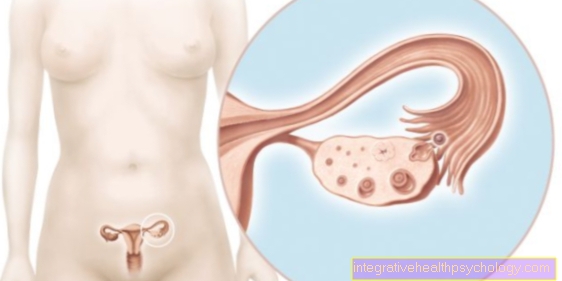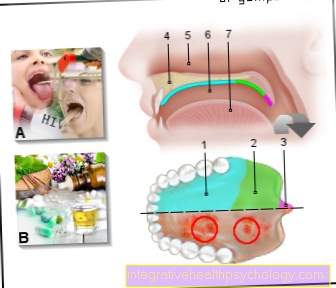Pneumonia incubation period
introduction
Inflammation of the lungs (pneumonia) is usually caused by an infection with bacteria or, more rarely, viruses. The time between infection and the actual onset of the disease is known as the incubation period. During the incubation period, the pathogen multiplies and spreads in the lungs, which ultimately results in the actual symptoms of pneumonia.
Please also read: lung infection

This is how long the incubation period is for pneumonia
The length of the incubation period for pneumonia depends, among other things, on the pathogen and can be very different. Bacteria of the genus Pneumococci, Haemophilus influenzae type B and Staphylococcus aureus often cause pneumonia by getting into the nasopharynx via droplets.
Further factors that influence the incubation time are general condition, age and the immune status of the patient. Older people or small children often have a weaker immune system, which means that the pathogens can multiply faster and pneumonia can break out earlier. Even patients who already suffer from another disease have weakened immune systems and thus a reduced protection against pathogens. The exact duration of the incubation period for pneumonia is therefore influenced by many circumstances and cannot be generalized. The period ranges from a few days to several weeks.
Are you already contagious during the incubation period?
Pneumonia is usually caused by pathogens and is therefore an infectious disease. Since the bacteria or viruses multiply during the incubation period, one is already contagious at this early stage. This means that other people can often be infected, even if the sick person does not even know that they have pneumonia.
Read our article on this: How contagious is pneumonia?
This is how I prevent the outbreak of disease during the incubation period
During the incubation period, it is generally difficult to prevent the outbreak of the disease, as the people affected usually do not know that they have become infected. There are no specific signs that clearly suggest a pneumonia outbreak will occur.
These articles might also interest you: Signs of pneumonia or How do I recognize pneumonia
If an infection is suspected, for example after contact with sick people, it can be helpful to strengthen the body's immune system. This makes it difficult for the pathogens to multiply in the body and, in the best case, prevents the disease from breaking out. Nevertheless, it cannot be ruled out that the pneumonia may break out.
Read more on the topic: How can you strengthen the immune system? or How can I strengthen my child's immune system?
This risk is particularly high in people with previous illnesses and in the elderly. Then the only thing left to do is to correctly interpret the first signs of pneumonia and to start treatment as soon as possible. The precautionary use of antibiotic medication is not recommended, however, as this can lead to the development of resistance.





























